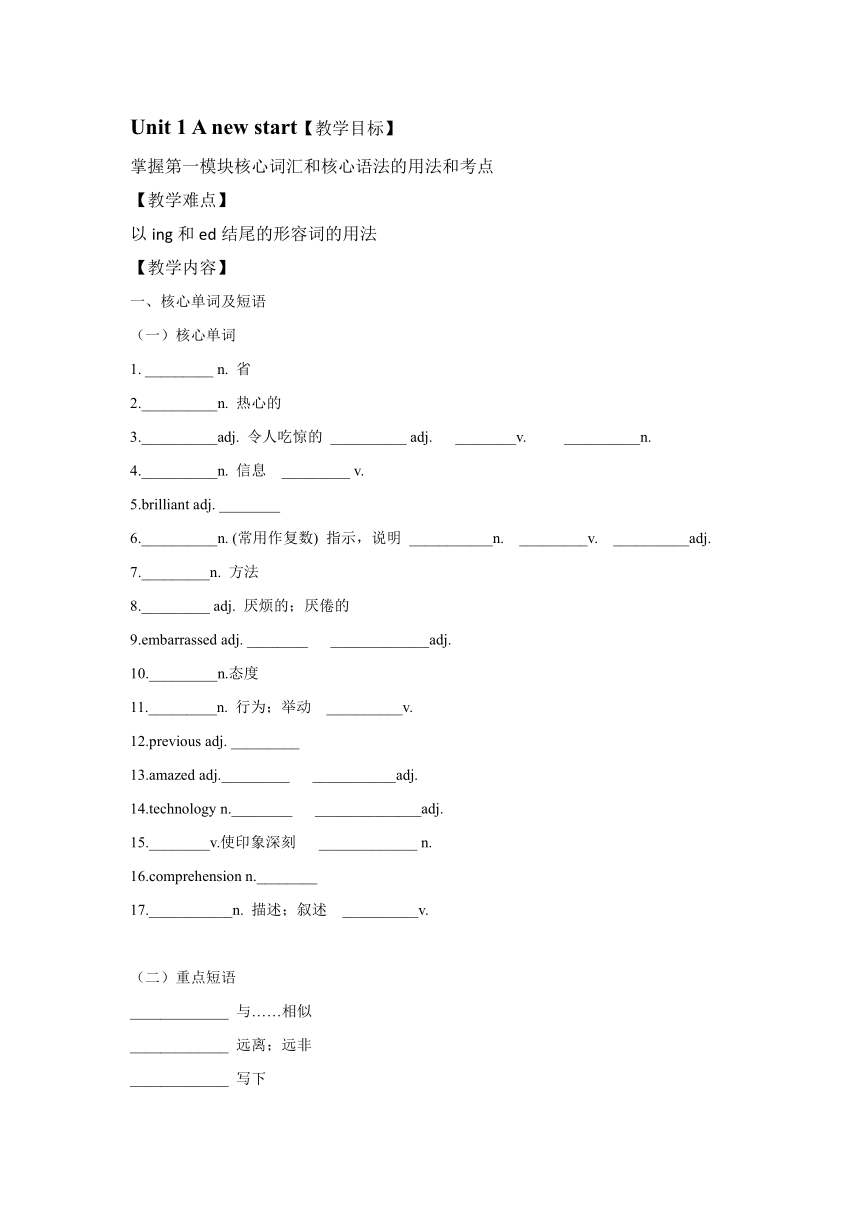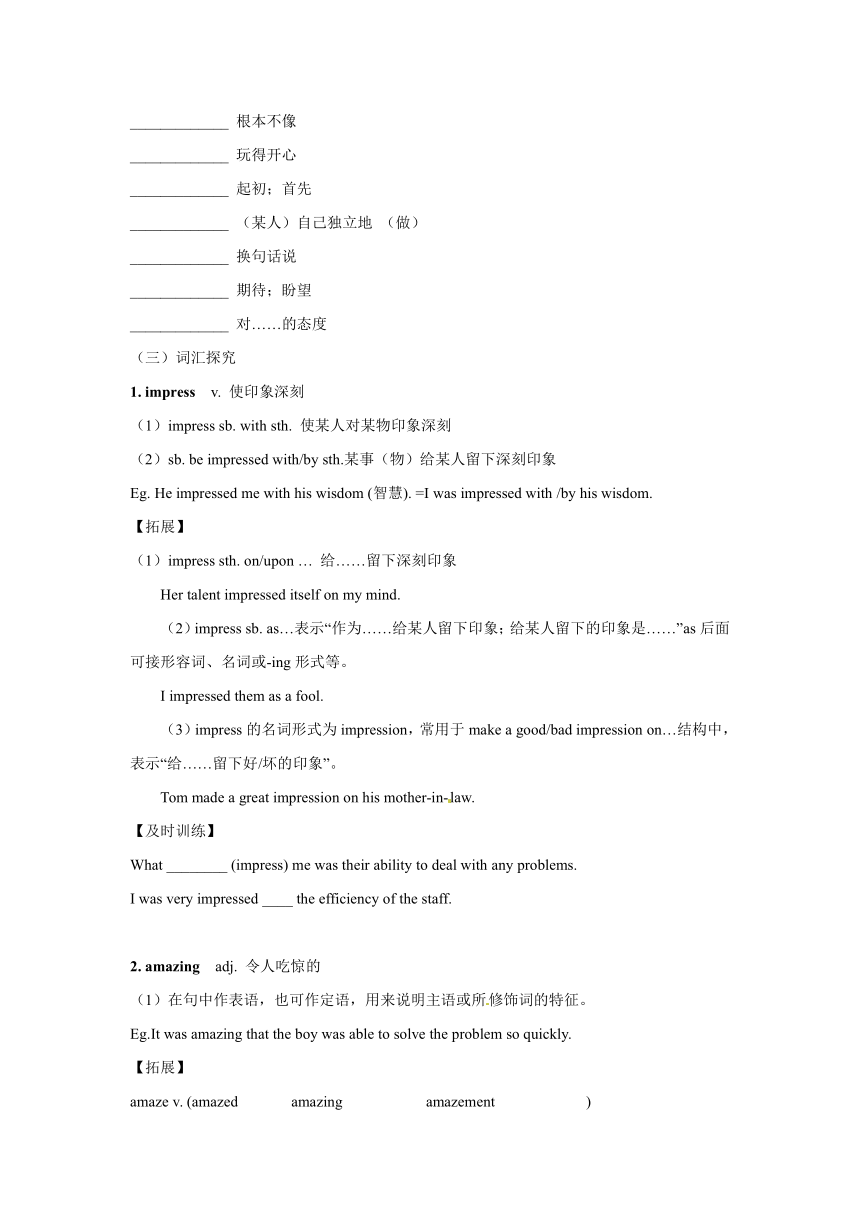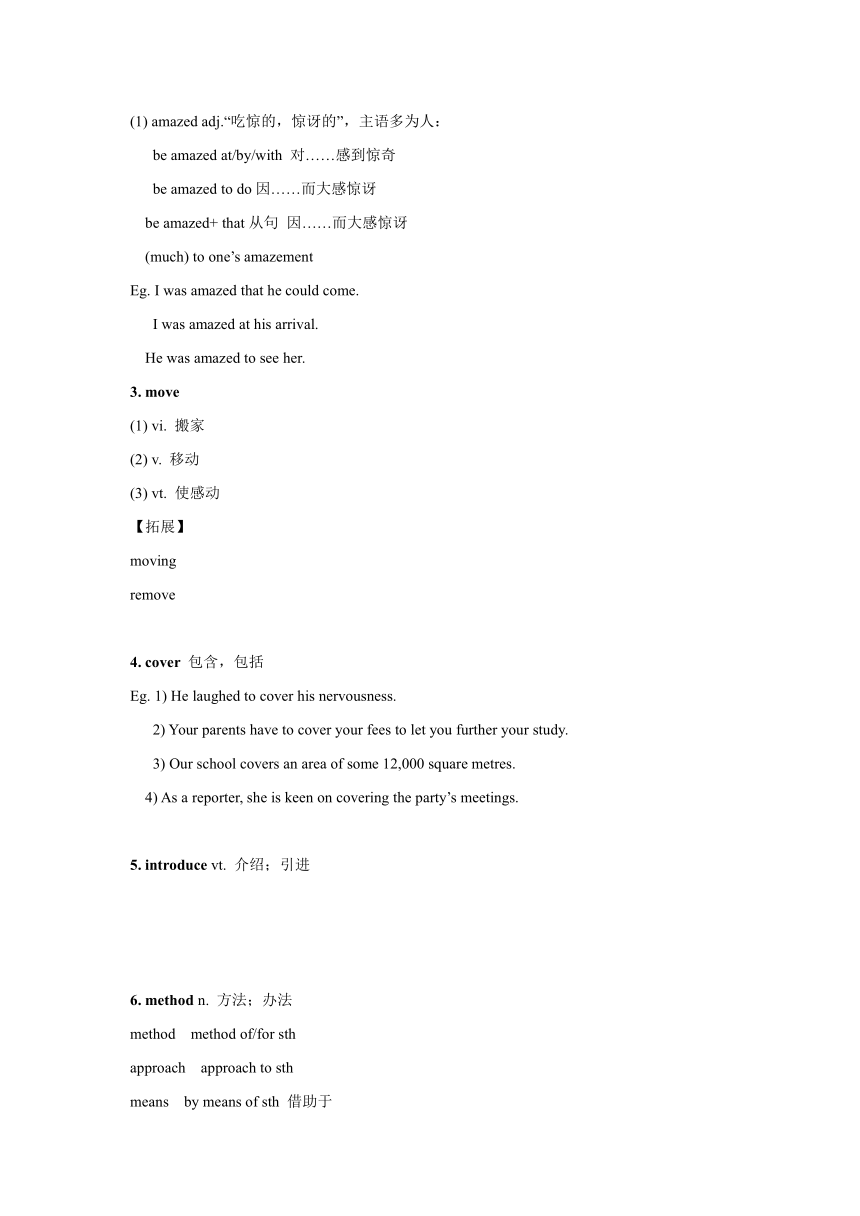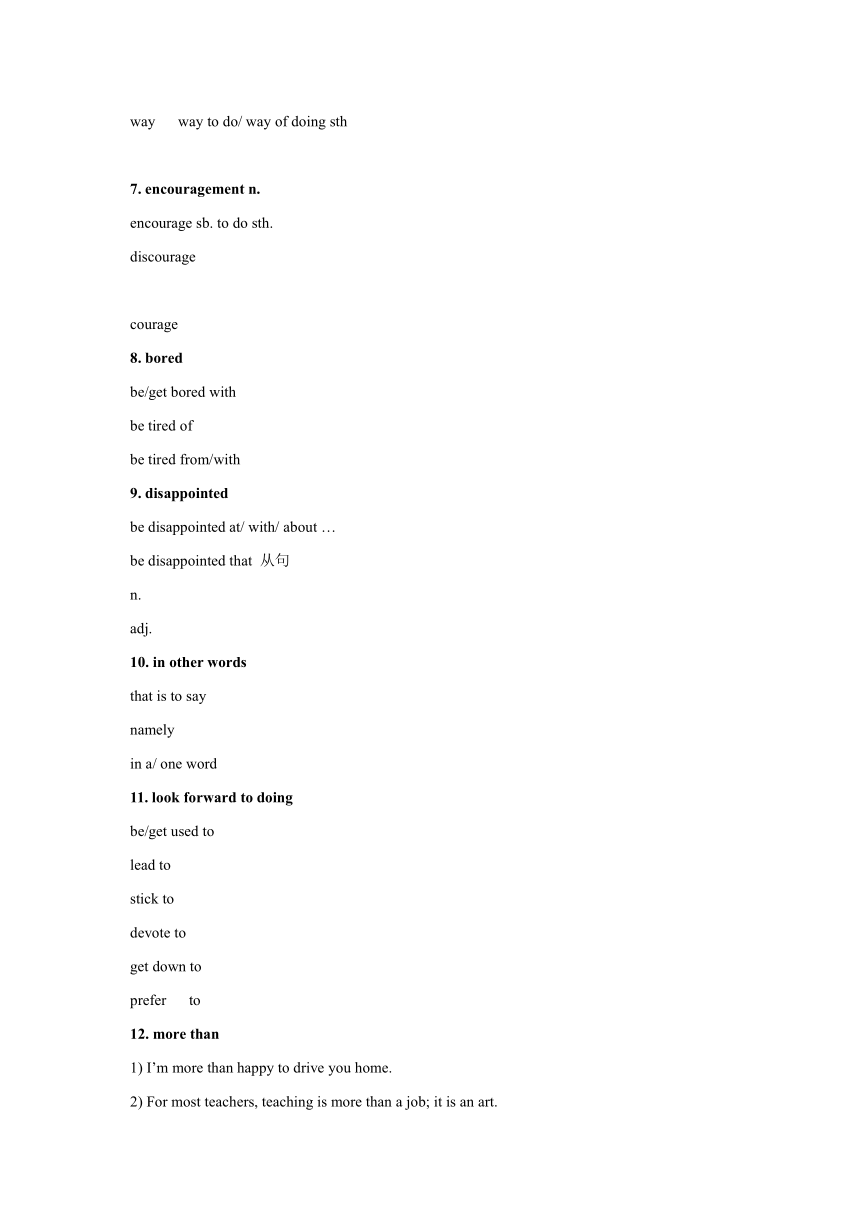2019-2020学年新外研版高中英语 必修 第一册 Unit 1 A new start学案(无答案)
文档属性
| 名称 | 2019-2020学年新外研版高中英语 必修 第一册 Unit 1 A new start学案(无答案) |

|
|
| 格式 | zip | ||
| 文件大小 | 13.9KB | ||
| 资源类型 | 教案 | ||
| 版本资源 | 外研版(2019) | ||
| 科目 | 英语 | ||
| 更新时间 | 2020-03-01 00:00:00 | ||
图片预览




文档简介
Unit
1
A
new
start【教学目标】
掌握第一模块核心词汇和核心语法的用法和考点
【教学难点】
以ing和ed结尾的形容词的用法
【教学内容】
一、核心单词及短语
(一)核心单词
1.
_________
n.
省
2.__________n.
热心的
3.__________adj.
令人吃惊的
__________
adj.
________v.
__________n.
4.__________n.
信息
_________
v.
5.brilliant
adj.
________
6.__________n.
(常用作复数)
指示,说明
___________n.
_________v.
__________adj.
7._________n.
方法
8._________
adj.
厌烦的;厌倦的
9.embarrassed
adj.
________
_____________adj.
10._________n.态度
11._________n.
行为;举动
__________v.
12.previous
adj.
_________
13.amazed
adj._________
___________adj.
14.technology
n.________
______________adj.
15.________v.使印象深刻
_____________
n.
prehension
n.________
17.___________n.
描述;叙述
__________v.
(二)重点短语
_____________
与……相似
_____________
远离;远非
_____________
写下
_____________
根本不像
_____________
玩得开心
_____________
起初;首先
_____________
(某人)自己独立地
(做)
_____________
换句话说
_____________
期待;盼望
_____________
对……的态度
(三)词汇探究
1.
impress
v.
使印象深刻
(1)impress
sb.
with
sth.
使某人对某物印象深刻
(2)sb.
be
impressed
with/by
sth.某事(物)给某人留下深刻印象
Eg.
He
impressed
me
with
his
wisdom
(智慧).
=I
was
impressed
with
/by
his
wisdom.
【拓展】
(1)impress
sth.
on/upon
…
给……留下深刻印象
Her
talent
impressed
itself
on
my
mind.
(2)impress
sb.
as…表示“作为……给某人留下印象;给某人留下的印象是……”as后面可接形容词、名词或-ing形式等。
I
impressed
them
as
a
fool.
(3)impress的名词形式为impression,常用于make
a
good/bad
impression
on…结构中,表示“给……留下好/坏的印象”。
Tom
made
a
great
impression
on
his
mother-in-law.
【及时训练】
What
________
(impress)
me
was
their
ability
to
deal
with
any
problems.
I
was
very
impressed
____
the
efficiency
of
the
staff.
2.
amazing
adj.
令人吃惊的
(1)在句中作表语,也可作定语,用来说明主语或所修饰词的特征。
Eg.It
was
amazing
that
the
boy
was
able
to
solve
the
problem
so
quickly.
【拓展】
amaze
v.
(amazed
amazing
amazement
)
(1)
amazed
adj.“吃惊的,惊讶的”,主语多为人:
be
amazed
at/by/with
对……感到惊奇
be
amazed
to
do因……而大感惊讶
be
amazed+
that从句
因……而大感惊讶
(much)
to
one’s
amazement
Eg.
I
was
amazed
that
he
could
come.
I
was
amazed
at
his
arrival.
He
was
amazed
to
see
her.
3.
move
(1)
vi.
搬家
(2)
v.
移动
(3)
vt.
使感动
【拓展】
moving
remove
4.
cover
包含,包括
Eg.
1)
He
laughed
to
cover
his
nervousness.
2)
Your
parents
have
to
cover
your
fees
to
let
you
further
your
study.
3)
Our
school
covers
an
area
of
some
12,000
square
metres.
4)
As
a
reporter,
she
is
keen
on
covering
the
party’s
meetings.
5.
introduce
vt.
介绍;引进
6.
method
n.
方法;办法
method
method
of/for
sth
approach
approach
to
sth
means
by
means
of
sth
借助于
way
way
to
do/
way
of
doing
sth
7.
encouragement
n.
encourage
sb.
to
do
sth.
discourage
courage
8.
bored
be/get
bored
with
be
tired
of
be
tired
from/with
9.
disappointed
be
disappointed
at/
with/
about
…
be
disappointed
that
从句
n.
adj.
10.
in
other
words
that
is
to
say
namely
in
a/
one
word
11.
look
forward
to
doing
be/get
used
to
lead
to
stick
to
devote
to
get
down
to
prefer
to
12.
more
than
1)
I’m
more
than
happy
to
drive
you
home.
2)
For
most
teachers,
teaching
is
more
than
a
job;
it
is
an
art.
3)
Be
too
strict
with
him.
He
is
more
lazy
than
stupid.
4)
He
is
no
more
fit
to
be
a
barber
than
I
am.
13.
be
divided
into
divided…
from…
divide
sth
between/among
sb.
14.
take
part
in
join
in
attend
二、时态复习
(一
)
一般现在时的用法
1)
表示习惯性或经常性的动作或状态。常与下列表示次数的频率副词连用:
often,
usually,
always,
sometimes,
seldom,
every
day
(week,
year,
night),
once
a
week等。
2)客观真理,事实
3)谚语,名言警句
4)主语现在的状态或特征,身份,性格,爱好,特长。
6)在由when,while,before,after,until,
as
soon
as,
once,
the
moment引导的时间状语从句,if,unless引导的条件状语从句和even
if,
whoever,whatever,
whenever,wherever,whoever引导的让步状语从句中,从句一般用现在时表将来。
7)表示按时刻表上将要发生的事情,
火车出发,飞机起飞,电影开场等,come,
go,
start,
leave,
begin,
set
off,
take
off…
①
We
will
have
an
exam
when
we
finish
the
textbook.
我们学完课本后将会进行一次测试。
②
I
will
tell
him
that
as
soon
as
I
see
him.我一见到他就会告诉他那件事。
③
We
have
to
wait
here
before
he
come.
④
My
plane
takes
off
at
3
pm.
(二)现在进行时的用法
1.
结构:be+动词现在分词
陈述句,一般疑问句,特殊疑问句转换
2.
用法
1)表示现在(说话瞬间)正在进行或发生的动作:I'm
doing
my
homework
2)表示目前一段时间内正在进行的动作
How
are
you
getting
on
with
your
English
this
term
3)表示一种经常重复的动作,与always,
forever,
all
the
time,
constantly,
continually连用,常表示不满、抱怨、惊奇或赞赏的情绪。如:He
is
always
smoking.
4)现在进行时表将来。用趋向性瞬间动词:go,
come,
begin,
leave,
arrive,
start等,表按计划、安排将要进行的动作
I’m
leaving
for
Beijing
tomorrow.
I’m
leaving
if
there
is
nothing
for
me
to
help.
注:有些动词通常工行不用于进行时态中
A
表感觉或情感的动词:
like,
hate,
smell,
notice,
want,
wish,
feel
B
表存在或所属:
exist,
stay,
have,
contain
C
表认识,理解:
know,
understand,
forget等
3.时间状语
主要有now;Look!或listen!
at
present,
at
the/
this
moment,
what
is
sb
doing。如:
Now
she
is
having
breakfast.
Listen!
Someone
is
singing
over
there.
三、ing和ed形容词
1.
概述
1)
-ing结尾的形容词,主要用于说明事物,表示事物的性质或特征,若用它们说明人,则表示此人具有此性质或特征。通常译为“令人……的”
2)
–ed结尾的形容词,常用来表示“特征”和“状态”通常用于说明句中主语(人)的情绪变化,常译为“某人感到……的”
2.句法功能
在句中作表语、定语、补语或状语。
(1)I’m
interested
in
interesting
people.
我对有趣的人感兴趣。
(2)He
had
a
pleased
smile
on
his
face.
他脸上露出了满意的微笑。
(3)The
film
is
very
boring.这部电影很乏味。(表语)
(4)His
behaviour
at
the
party
made
us
disappointed.他在晚会上的表现使我们感到很失望。
(5)His
parents
knew
he
passed
the
exam,
surprised
and
happy.
(6)He
found
it
interesting
to
play
games
with
his
sister.
3.
常见的ing结尾的形容词和ed结尾的形容词
amazed吃惊的/惊讶的
amazing令人吃惊的
interested
感到有趣的
interesting
有趣的
bored感到厌烦的
boring令人厌烦的
disappointed失望的
disappointing令人失望的
embarrassed尴尬的,难堪的
embarrassing令人尴尬的
pleased高兴的
pleasing
令人高兴的
surprised感到吃惊的
surprising
令人吃惊的
moved
感动的
moving
令人感动的
worried感到着急的
worrying
令人着急的
excited感到激动的
exciting令人激动的
比较并体会以下句子:He
is
frightened.
他很害怕。He
is
frightening.
他很吓人。
注意:
原则上,-ed形容词通常直接用于说明人,但当被修饰的词为appearance(外貌),
cry(哭声),
face(表情),
expression(表情),smile(微笑),
voice(声音),
mood(情绪)等声音或面部表情的名词时,要用-ed结尾的形容词。
He
told
me
the
news
in
a
very
excited
voice.
他声音很激动地告诉了我这个消息。(定语)
四、易混辨析
that
可指代前面出现过的单数可数或不可数名词,其复数形式为those
one
指代前面出现过的一类十五中的“一个”,同类不同个,复数为ones
it
特指前面提到过的同一事物
【及时训练】
1.
These
machines
are
better
than
______
we
bought
last
year.
2.
I
have
lost
my
pen.
I
need
to
buy
a
new
______.
3.Tom
bought
a
red
pen
and
gave
_____
to
Mike.
4.
The
price
of
this
pen
is
higher
than
_____
of
Jack’s.
五、比较级的倍数表达
1.
2.
3.
翻译:实验之后,这棵树的高度是原来的四倍。
1.
2.
3.
1
A
new
start【教学目标】
掌握第一模块核心词汇和核心语法的用法和考点
【教学难点】
以ing和ed结尾的形容词的用法
【教学内容】
一、核心单词及短语
(一)核心单词
1.
_________
n.
省
2.__________n.
热心的
3.__________adj.
令人吃惊的
__________
adj.
________v.
__________n.
4.__________n.
信息
_________
v.
5.brilliant
adj.
________
6.__________n.
(常用作复数)
指示,说明
___________n.
_________v.
__________adj.
7._________n.
方法
8._________
adj.
厌烦的;厌倦的
9.embarrassed
adj.
________
_____________adj.
10._________n.态度
11._________n.
行为;举动
__________v.
12.previous
adj.
_________
13.amazed
adj._________
___________adj.
14.technology
n.________
______________adj.
15.________v.使印象深刻
_____________
n.
prehension
n.________
17.___________n.
描述;叙述
__________v.
(二)重点短语
_____________
与……相似
_____________
远离;远非
_____________
写下
_____________
根本不像
_____________
玩得开心
_____________
起初;首先
_____________
(某人)自己独立地
(做)
_____________
换句话说
_____________
期待;盼望
_____________
对……的态度
(三)词汇探究
1.
impress
v.
使印象深刻
(1)impress
sb.
with
sth.
使某人对某物印象深刻
(2)sb.
be
impressed
with/by
sth.某事(物)给某人留下深刻印象
Eg.
He
impressed
me
with
his
wisdom
(智慧).
=I
was
impressed
with
/by
his
wisdom.
【拓展】
(1)impress
sth.
on/upon
…
给……留下深刻印象
Her
talent
impressed
itself
on
my
mind.
(2)impress
sb.
as…表示“作为……给某人留下印象;给某人留下的印象是……”as后面可接形容词、名词或-ing形式等。
I
impressed
them
as
a
fool.
(3)impress的名词形式为impression,常用于make
a
good/bad
impression
on…结构中,表示“给……留下好/坏的印象”。
Tom
made
a
great
impression
on
his
mother-in-law.
【及时训练】
What
________
(impress)
me
was
their
ability
to
deal
with
any
problems.
I
was
very
impressed
____
the
efficiency
of
the
staff.
2.
amazing
adj.
令人吃惊的
(1)在句中作表语,也可作定语,用来说明主语或所修饰词的特征。
Eg.It
was
amazing
that
the
boy
was
able
to
solve
the
problem
so
quickly.
【拓展】
amaze
v.
(amazed
amazing
amazement
)
(1)
amazed
adj.“吃惊的,惊讶的”,主语多为人:
be
amazed
at/by/with
对……感到惊奇
be
amazed
to
do因……而大感惊讶
be
amazed+
that从句
因……而大感惊讶
(much)
to
one’s
amazement
Eg.
I
was
amazed
that
he
could
come.
I
was
amazed
at
his
arrival.
He
was
amazed
to
see
her.
3.
move
(1)
vi.
搬家
(2)
v.
移动
(3)
vt.
使感动
【拓展】
moving
remove
4.
cover
包含,包括
Eg.
1)
He
laughed
to
cover
his
nervousness.
2)
Your
parents
have
to
cover
your
fees
to
let
you
further
your
study.
3)
Our
school
covers
an
area
of
some
12,000
square
metres.
4)
As
a
reporter,
she
is
keen
on
covering
the
party’s
meetings.
5.
introduce
vt.
介绍;引进
6.
method
n.
方法;办法
method
method
of/for
sth
approach
approach
to
sth
means
by
means
of
sth
借助于
way
way
to
do/
way
of
doing
sth
7.
encouragement
n.
encourage
sb.
to
do
sth.
discourage
courage
8.
bored
be/get
bored
with
be
tired
of
be
tired
from/with
9.
disappointed
be
disappointed
at/
with/
about
…
be
disappointed
that
从句
n.
adj.
10.
in
other
words
that
is
to
say
namely
in
a/
one
word
11.
look
forward
to
doing
be/get
used
to
lead
to
stick
to
devote
to
get
down
to
prefer
to
12.
more
than
1)
I’m
more
than
happy
to
drive
you
home.
2)
For
most
teachers,
teaching
is
more
than
a
job;
it
is
an
art.
3)
Be
too
strict
with
him.
He
is
more
lazy
than
stupid.
4)
He
is
no
more
fit
to
be
a
barber
than
I
am.
13.
be
divided
into
divided…
from…
divide
sth
between/among
sb.
14.
take
part
in
join
in
attend
二、时态复习
(一
)
一般现在时的用法
1)
表示习惯性或经常性的动作或状态。常与下列表示次数的频率副词连用:
often,
usually,
always,
sometimes,
seldom,
every
day
(week,
year,
night),
once
a
week等。
2)客观真理,事实
3)谚语,名言警句
4)主语现在的状态或特征,身份,性格,爱好,特长。
6)在由when,while,before,after,until,
as
soon
as,
once,
the
moment引导的时间状语从句,if,unless引导的条件状语从句和even
if,
whoever,whatever,
whenever,wherever,whoever引导的让步状语从句中,从句一般用现在时表将来。
7)表示按时刻表上将要发生的事情,
火车出发,飞机起飞,电影开场等,come,
go,
start,
leave,
begin,
set
off,
take
off…
①
We
will
have
an
exam
when
we
finish
the
textbook.
我们学完课本后将会进行一次测试。
②
I
will
tell
him
that
as
soon
as
I
see
him.我一见到他就会告诉他那件事。
③
We
have
to
wait
here
before
he
come.
④
My
plane
takes
off
at
3
pm.
(二)现在进行时的用法
1.
结构:be+动词现在分词
陈述句,一般疑问句,特殊疑问句转换
2.
用法
1)表示现在(说话瞬间)正在进行或发生的动作:I'm
doing
my
homework
2)表示目前一段时间内正在进行的动作
How
are
you
getting
on
with
your
English
this
term
3)表示一种经常重复的动作,与always,
forever,
all
the
time,
constantly,
continually连用,常表示不满、抱怨、惊奇或赞赏的情绪。如:He
is
always
smoking.
4)现在进行时表将来。用趋向性瞬间动词:go,
come,
begin,
leave,
arrive,
start等,表按计划、安排将要进行的动作
I’m
leaving
for
Beijing
tomorrow.
I’m
leaving
if
there
is
nothing
for
me
to
help.
注:有些动词通常工行不用于进行时态中
A
表感觉或情感的动词:
like,
hate,
smell,
notice,
want,
wish,
feel
B
表存在或所属:
exist,
stay,
have,
contain
C
表认识,理解:
know,
understand,
forget等
3.时间状语
主要有now;Look!或listen!
at
present,
at
the/
this
moment,
what
is
sb
doing。如:
Now
she
is
having
breakfast.
Listen!
Someone
is
singing
over
there.
三、ing和ed形容词
1.
概述
1)
-ing结尾的形容词,主要用于说明事物,表示事物的性质或特征,若用它们说明人,则表示此人具有此性质或特征。通常译为“令人……的”
2)
–ed结尾的形容词,常用来表示“特征”和“状态”通常用于说明句中主语(人)的情绪变化,常译为“某人感到……的”
2.句法功能
在句中作表语、定语、补语或状语。
(1)I’m
interested
in
interesting
people.
我对有趣的人感兴趣。
(2)He
had
a
pleased
smile
on
his
face.
他脸上露出了满意的微笑。
(3)The
film
is
very
boring.这部电影很乏味。(表语)
(4)His
behaviour
at
the
party
made
us
disappointed.他在晚会上的表现使我们感到很失望。
(5)His
parents
knew
he
passed
the
exam,
surprised
and
happy.
(6)He
found
it
interesting
to
play
games
with
his
sister.
3.
常见的ing结尾的形容词和ed结尾的形容词
amazed吃惊的/惊讶的
amazing令人吃惊的
interested
感到有趣的
interesting
有趣的
bored感到厌烦的
boring令人厌烦的
disappointed失望的
disappointing令人失望的
embarrassed尴尬的,难堪的
embarrassing令人尴尬的
pleased高兴的
pleasing
令人高兴的
surprised感到吃惊的
surprising
令人吃惊的
moved
感动的
moving
令人感动的
worried感到着急的
worrying
令人着急的
excited感到激动的
exciting令人激动的
比较并体会以下句子:He
is
frightened.
他很害怕。He
is
frightening.
他很吓人。
注意:
原则上,-ed形容词通常直接用于说明人,但当被修饰的词为appearance(外貌),
cry(哭声),
face(表情),
expression(表情),smile(微笑),
voice(声音),
mood(情绪)等声音或面部表情的名词时,要用-ed结尾的形容词。
He
told
me
the
news
in
a
very
excited
voice.
他声音很激动地告诉了我这个消息。(定语)
四、易混辨析
that
可指代前面出现过的单数可数或不可数名词,其复数形式为those
one
指代前面出现过的一类十五中的“一个”,同类不同个,复数为ones
it
特指前面提到过的同一事物
【及时训练】
1.
These
machines
are
better
than
______
we
bought
last
year.
2.
I
have
lost
my
pen.
I
need
to
buy
a
new
______.
3.Tom
bought
a
red
pen
and
gave
_____
to
Mike.
4.
The
price
of
this
pen
is
higher
than
_____
of
Jack’s.
五、比较级的倍数表达
1.
2.
3.
翻译:实验之后,这棵树的高度是原来的四倍。
1.
2.
3.
